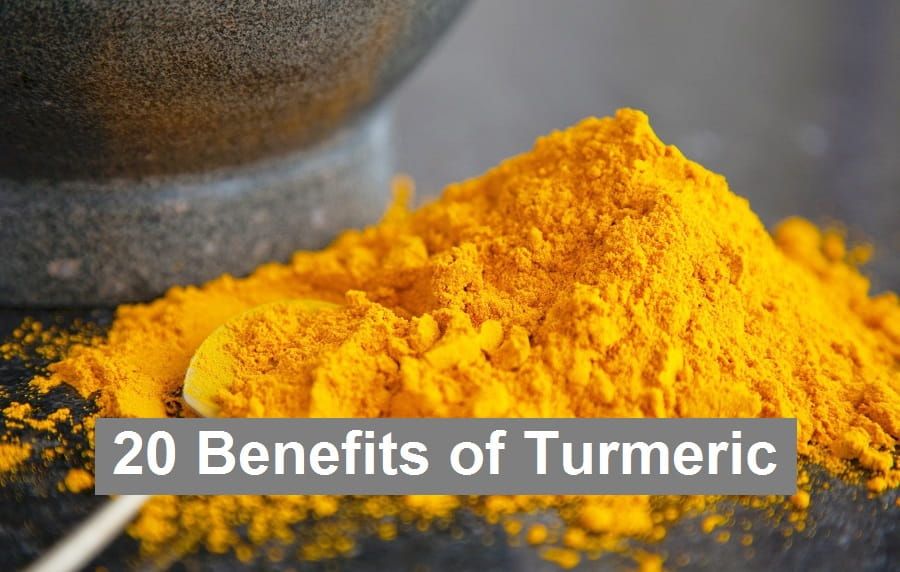Turmeric is a spice that has many benefits. Its scientific name is Curcuma longa. For centuries, turmeric has been used in traditional Indian and Chinese medicine. The benefits of turmeric are many. It has curcumin, which has numerous health benefits.
Turmeric is a popular ingredient in many curries and other dishes. Packed with herbal properties, this spice is well known in culinary and medicinal, as well as cosmetic applications. There are many more turmeric benefits. Contains curcumin, an anti-inflammatory and antioxidant compound.
Here are 20 benefits of turmeric, that make it mandatory to consume daily –
1. Reduces inflammation
One of the best-known benefits of turmeric is its powerful anti-inflammatory properties. Turmeric contains curcumin, a powerful anti-inflammatory compound. Inflammation is the root cause of many chronic diseases, including heart disease, cancer, and Alzheimer’s disease. Including turmeric in your diet can help reduce these risks.
2. Increases immunity
Turmeric can help boost immunity and fight infections. Curcumin has been shown to increase the production of white blood cells, which are essential for fighting infection.
3. Improved digestion
Turmeric stimulates the production of bile, which helps digest fats. This digestive power can help relieve symptoms of indigestion and bloating. Additionally, turmeric can protect the digestive system from conditions such as inflammatory bowel disease (IBD) and irritable bowel syndrome (IBS).
4. Protects the liver
The liver is crucial to the body’s detoxification process. Turmeric can support liver function by increasing its ability to detoxify harmful substances. It can help prevent liver disease and damage caused by excessive alcohol consumption. It can help protect the liver from damage. Curcumin has been shown to reduce liver inflammation and prevent the growth of scar tissue.
5. Protects the skin
Turmeric has been used in skin care for centuries due to its antibacterial and anti-inflammatory properties. It can help reduce acne, soothe irritated skin and brighten the complexion. Some people even make turmeric masks to achieve a healthy, glowing complexion. Turmeric Turmeric can help protect the skin from sun damage and premature aging. Curcumin helps reduce skin inflammation and increase collagen production.
6. Improves brain health
Turmeric’s anti-inflammatory and antioxidant effects may benefit brain health. Curcumin can reduce inflammation in the brain and improve the production of new brain cells.
7. Protects against heart disease
By improving the function of the endothelium, the lining of blood vessels, curcumin may have a positive effect on heart health. It can help control blood pressure and reduce the risk of heart disease. Turmeric’s anti-inflammatory properties also contribute to overall cardiovascular wellness.
8. Reduces the risk of cancer
Curcumin has anti-cancer potential against various cancers including breast cancer, colon cancer and prostate cancer. It can inhibit the growth of cancer cells, prevent angiogenesis.
9. Improves mood
Turmeric helps improve mood and reduce symptoms of depression.
10. Helps with weight loss
Turmeric can help with weight loss by increasing metabolism and reducing appetite. Curcumin helps increase heat production in the body, which can help burn more calories.
11. Improves sleep quality
Turmeric can help improve sleep quality by reducing stress and anxiety. Melatonin is a hormone that controls sleep, and studies have shown that curcumin can enhance its synthesis. If you have insomnia, know how to cure insomnia in 12 minutes.
12. Reduces the risk of diabetes
Turmeric can help control diabetes by lowering blood sugar levels and improving insulin sensitivity. Although it should not replace diabetes medication, including turmeric in a diabetes-friendly diet can be beneficial.
13. Improves kidney function
Turmeric has been shown to improve kidney function by reducing inflammation and preventing kidney stone formation. Curcumin is effective in treating people with chronic kidney disease.
14. Protects against lung disease
Turmeric has been shown to protect against lung disease by reducing inflammation and preventing the growth of scar tissue in the lungs. Curcumin is effective in treating patients with asthma and chronic obstructive pulmonary disease (COPD).
15. Improves eye health
Turmeric can improve eye health and protect against eye diseases like macular degeneration and glaucoma. Curcumin helps reduce eye inflammation and protect the eye from damage caused by free radicals.
16. Improves oral health
Turmeric helps improve oral health and prevent gum disease. Curcumin can reduce gum inflammation and kill harmful bacteria in the mouth.
17. Boosts athletic performance
Turmeric has been shown to increase athletic performance by reducing inflammation and improving muscle recovery. Curcumin has been shown to be effective in reducing muscle soreness and improving exercise performance in athletes.
18. Improves sexual function
Turmeric can improve sexual performance in both men and women. Curcumin helps increase testosterone levels in men and improves libido and sexual satisfaction in women.
19. Anti-Aging Benefits
The antioxidant properties of turmeric help protect the skin from premature aging caused by environmental factors like UV radiation and pollution. By reducing oxidative stress and promoting collagen production, turmeric can help maintain youthful skin.
20. Balances hormones
In some cases, turmeric can help balance hormones. Especially in women who experience symptoms of hormonal imbalance, such as polycystic ovary syndrome (PCOS) or menopause. It can relieve symptoms like irregular periods and mood swings.
Related Article – Eating Raw Cloves Daily and Its Side Effects
Turmeric Side Effects
Turmeric is generally safe for most people to eat. However, it may have certain side effects, including constipation, diarrhea, and upset stomach. Turmeric can also interact with some medications, so it’s important to talk to your doctor before taking a turmeric supplement.
How to use turmeric
There are numerous ways to eat turmeric. It can be used on the skin, added to food, or consumed as a supplement.
To add turmeric to food:
- You can add turmeric powder to curries, stews and other dishes.
- You can make turmeric tea by soaking turmeric powder in hot water.
- You can add turmeric to smoothies and juices.
- You can make turmeric paste by mixing turmeric powder with water or honey. This paste can be applied to toast, sandwiches or other foods.
To take turmeric supplements:
- Turmeric supplements are available in capsule, tablet and powder form.
- The recommended dosage of turmeric supplements varies depending on the condition being treated.
- It’s important to talk to your doctor before taking a turmeric supplement, especially if you have any underlying health conditions.
To apply turmeric on the skin:
- Mix turmeric powder with water or honey to make a paste.
- Apply the paste on the affected area and leave it for 15-30 minutes.
- Wash off the paste with water.
Conclusion
Turmeric is a true powerhouse of health benefits. It is anti-inflammatory, antioxidant and immune-boosting. Turmeric is effective in treating various conditions including arthritis, cancer, heart disease and Alzheimer’s disease. Turmeric can be consumed in a variety of ways, including adding it to food, taking it as a supplement, or applying it to the skin. Turmeric is generally safe for most people, but it can cause some side effects, such as stomach upset, diarrhea, and constipation. It’s important to talk to your doctor before taking a turmeric supplement, especially if you have any underlying health conditions.




